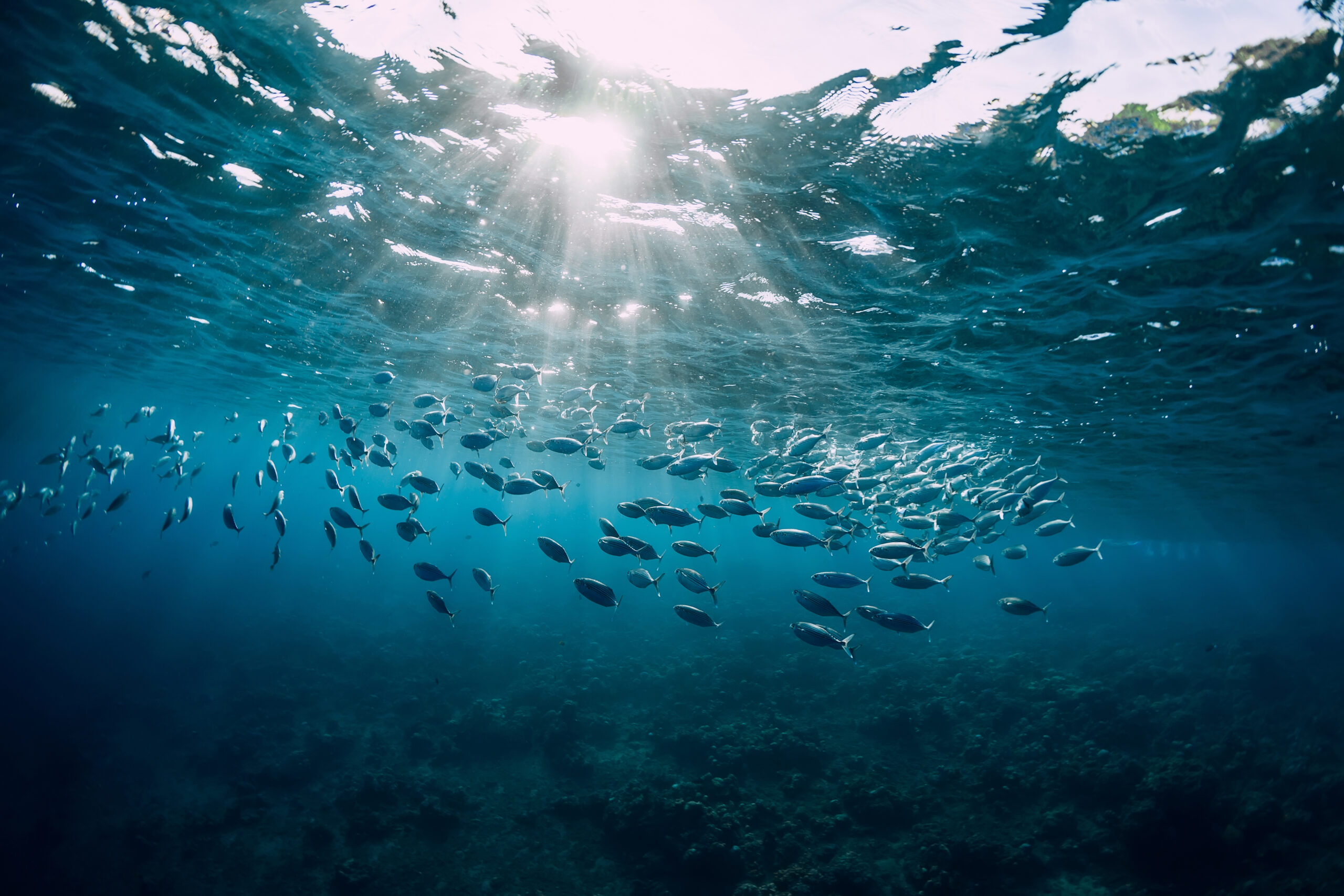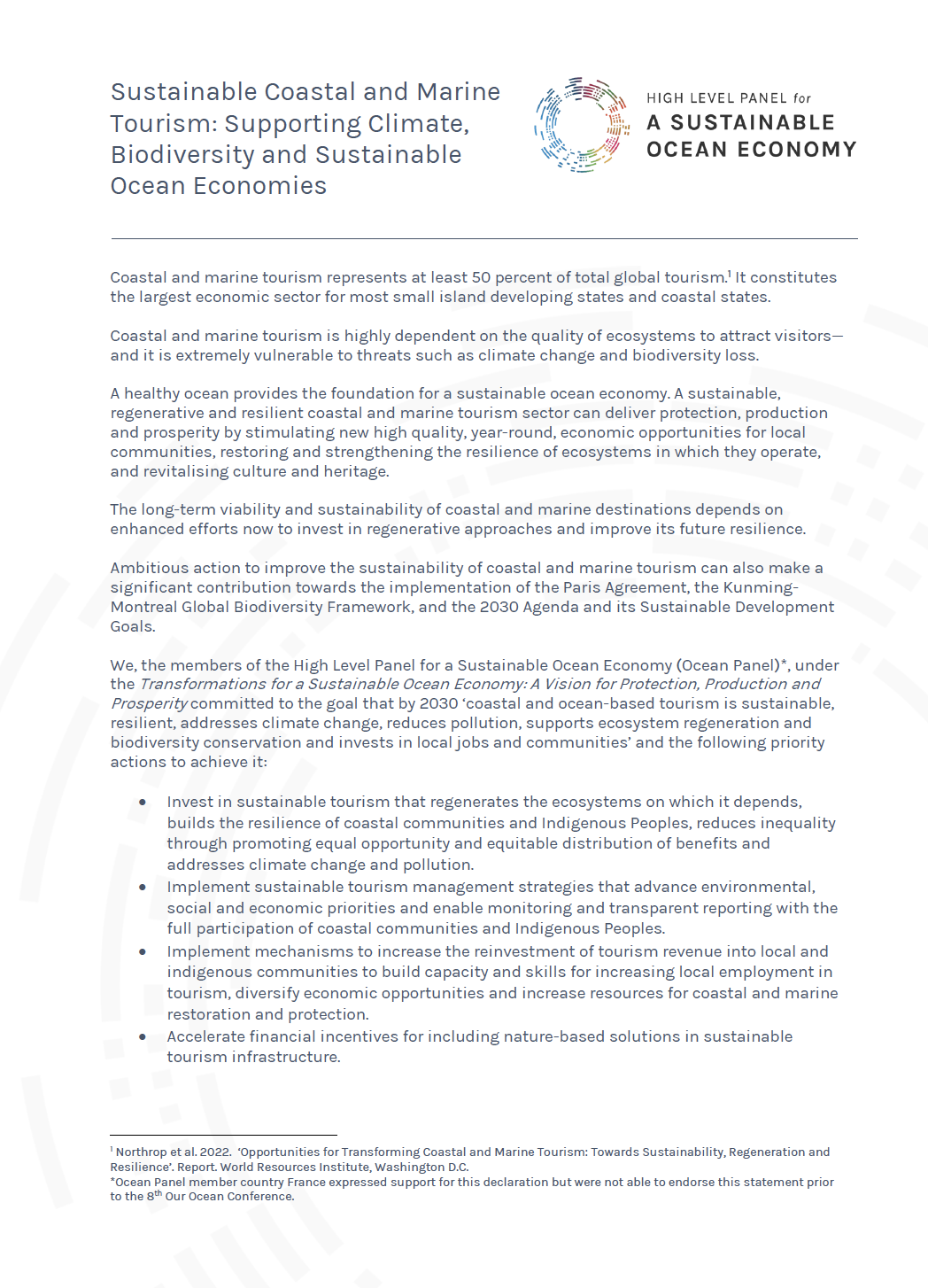Coastal and marine tourism represents at least 50 percent of total global tourism.1 It constitutes the largest economic sector for most small island developing states and coastal states.
Coastal and marine tourism is highly dependent on the quality of ecosystems to attract visitors—and it is extremely vulnerable to threats such as climate change and biodiversity loss.
A healthy ocean provides the foundation for a sustainable ocean economy. A sustainable, regenerative and resilient coastal and marine tourism sector can deliver protection, production and prosperity by stimulating new high quality, year-round, economic opportunities for local communities, restoring and strengthening the resilience of ecosystems in which they operate, and revitalising culture and heritage.
The long-term viability and sustainability of coastal and marine destinations depends on enhanced efforts now to invest in regenerative approaches and improve its future resilience.
Ambitious action to improve the sustainability of coastal and marine tourism can also make a significant contribution towards the implementation of the Paris Agreement, the Kunming-Montreal Global Biodiversity Framework, and the 2030 Agenda and its Sustainable Development Goals.
We, the members of the High Level Panel for a Sustainable Ocean Economy (Ocean Panel)*, under the Transformations for a Sustainable Ocean Economy: A Vision for Protection, Production and Prosperity committed to the goal that by 2030 ‘coastal and ocean-based tourism is sustainable, resilient, addresses climate change, reduces pollution, supports ecosystem regeneration and biodiversity conservation and invests in local jobs and communities’ and the following priority actions to achieve it:
- Invest in sustainable tourism that regenerates the ecosystems on which it depends, builds the resilience of coastal communities and Indigenous Peoples, reduces inequality through promoting equal opportunity and equitable distribution of benefits and addresses climate change and pollution.
- Implement sustainable tourism management strategies that advance environmental, social and economic priorities and enable monitoring and transparent reporting with the full participation of coastal communities and Indigenous Peoples.
- Implement mechanisms to increase the reinvestment of tourism revenue into local and indigenous communities to build capacity and skills for increasing local employment in tourism, diversify economic opportunities and increase resources for coastal and marine restoration and protection.
- Accelerate financial incentives for including nature-based solutions in sustainable tourism infrastructure.
- Invest in sewerage and wastewater infrastructure for coastal and marine tourism to improve the health of coastal communities and reduce the impacts on coastal and marine ecosystems.
To support an acceleration of progress on these priority actions, the Panel commissioned an expert report on ocean tourism, Opportunities for Transforming Coastal and Marine Tourism: Towards Sustainability, Regeneration and Resilience. As members of the Ocean Panel, we call on governments and marine and coastal tourism sector stakeholders to promote:
- Greater co-operation and collaboration. Everyone in the tourism sector has a role to play, including supporting genuine partnerships that provide opportunities for leadership from local communities.
- A seat at the table. Ensure tourism is integrated into the ocean, climate and biodiversity agendas and relevant international platforms.
- Action on climate change. Accelerate efforts to reduce emissions across the tourism sector and align with the temperature goal of the Paris Agreement and keeping within reach a 1.5oC limit to temperature rise, including through collaboration with countries and relevant non-state actors and initiatives, such as the Glasgow Declaration on Climate Action in Tourism.
- Nature-positive tourism. Utilise nature-based solutions to improve the resilience of coastal and marine tourism and ensure alignment with the Kunming-Montreal Global Biodiversity Framework.
- Investment to support the transformation. To finance a positive transformation of tourism, existing financial and incentive structures will need to be revised and many destinations will require new innovative and sustainable financial mechanisms, including blended finance.
| Anthony Albanese
Prime Minister of Australia
|
William Samoei Ruto
President of Kenya |
| Justin Trudeau
Prime Minister of Canada
|
Andrés Manuel López Obrador
President of Mexico |
| Gabriel Boric
President of Chile
|
Hage G. Geingob President of Namibia |
| Sitiveni Rabuka
Prime Minister of Fiji
|
Jonas Gahr Støre
Prime Minister of Norway |
| Nana Addo Dankwa Akufo-Addo
President of Ghana
|
Surangel Whipps, Jr.
President of Palau |
| Joko Widodo
President of Indonesia
|
António Costa
Prime Minister of Portugal |
| Andrew Michael Holness
Prime Minister of Jamaica
|
Rishi Sunak
Prime Minister of United Kingdom |
| Fumio Kishida
Prime Minister of Japan
|
Joseph R. Biden, Jr.
President of the United States of America |


 Previous
Previous



